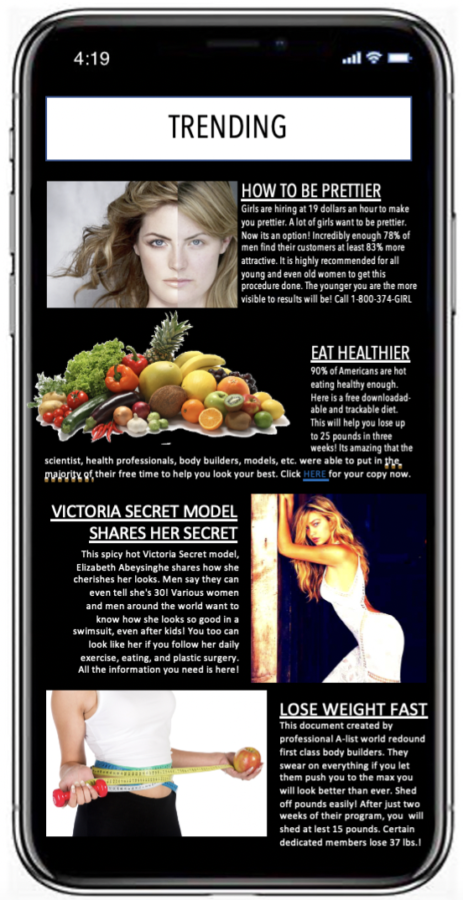Social media’s effect on teen body image
(Courtesy of Britannica Image Quest and Apple; phone screen made by Sara Price)
An example of what a young girls phone could look like today.
Everyone has, is, or will live through the unquestionably most awkward stage of their life, being a teenager. Many adults can admit that high school was one of the hardest times of their life but a lot has changed for adolescents since then.
The internet has been introduced to a large group of insecure, immature, vulnerable young adults, which has only made things harder for kids today. Between trying to juggle making good decisions, choosing the right environment and people, expressing emotions, and having the constant worry over the future, grades, friendships, and relationships. The internet adds high unrealistic standards for grades, homelife, mental health, and especially body image, leading to trends or celebrities which subliminally encourage and enable eating disorders.
According to Raising Teens Today, in a poll of adolescents, almost every teen agreed “that as much as they love their parents, oftentimes, their parents just ‘don’t get’ what they’re going through.”
Instagram, Pinterest, Snapchat, Twitter, VSCO, TikTok, and more seem to have a certain algorithm where skinnier girls, with unrealistic body sizes, become very popular and gain a large following of impressionable children and teenagers alike. In other words, they go viral. This leads many adolescent girls to believe the thinner and more “ideal” they are that they too will become more popular and liked by others, hoping to impress those around them or even be adored online.
Body image is a very real problem that a lot of people in said age group struggle with, which can lead to intrusive thoughts and can even stem to more negative thoughts, feelings, and actions. Kids who are having a hard time processing self-love because of the high standards the internet sets often are dealing with insecurities, depression, anxiety, eating disorders, suicidal idealogy, and possibly self-harm.
According to Sage Journals, social media content that “promotes” self-harm is not allowed on the website, although, unfortunately, it is very likely that kids and teenagers will encounter and witness these types of images, videos, and comments.
These images and subliminal messages can heavily influence teens today, due to how vulnerable and easily influenced they are, which can negatively affect their mental health without anyone else knowing. This can make it very hard for parents and guardians to understand what teenagers today are going through.
Not only does social media have an effect on teens, but something as simple as going shopping contributes to girls’ self-esteem. Well-known stores such as Pacsun, Forever 21, and Brandy Melville are known for having very small, almost child-like sizes that restrict teenage girls from buying cute and popular clothes in their size. Girls who wish to buy these clothes experience a conflict in their minds, believing that being smaller is “normal.” Due to the discrepancy in girls’ clothing sizes, the sizes of the clothes could be drastically different from store-to-store, so what may be deemed as a small somewhere could be categorized as a large someplace else.
Even store mannequins are built to be thin, wearing clothes that may not look the same on the majority of customers.. Girls can feel embarrassed or ashamed from just picking out what size shirt they want to buy, which can impact the way they view themselves.
If these girls look different from other girls that they see, different can be distorted into ugly or “undesirable.” Many people can’t control the way they look, as it is not just a matter of losing weight. Being born with broad shoulders or a wide ribcage can make young girls incredibly insecure.
So the next time you’re scrolling through your phone, shopping online, or even in stores just remember that bodies come in all shapes and sizes and one is not better than the other. Practicing self-love and self-care is heavily encouraged as it is important to learn to love yourself for who you are at this young, vulnerable, and impressionable age. Just actions as simple as complimenting yourself in the mirror or having a personal spa day can make you feel better in your own skin. Along with complimenting yourself, try to compliment those around you, as one little compliment can greatly influence someone’s day and overall self-image.
Your donation will support the student journalists of Highlands High School. Your contribution will allow us to cover our annual website hosting costs.



